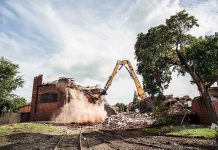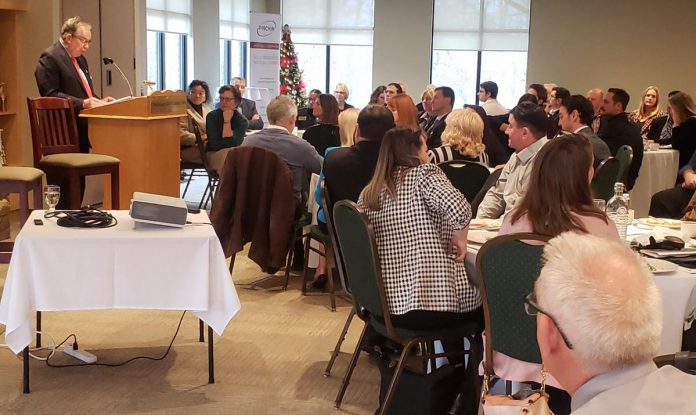
One spoke of moving Peterborough forward, the other spoke of moving Ontarians more efficiently, and both spoke of the their vision and determination to make both of those things happen.
Peterborough Mayor Jeff Leal and Martin Imbleau, the newly minted CEO of VIA HFR (High Frequency Rail), shared the podium at the annual Mayor’s Breakfast held early Tuesday (November 21) at the Peterborough Golf Country and Club.
Hosted by the Peterborough and the Kawarthas Chamber of Commerce, the breakfast event saw a packed room of local business leaders and politicians, Peterborough County Warden Bonnie Clark among the latter, listen as both speakers updated the current status of their respective portfolios while providing a peek of what’s ahead.
While the gathering was held to mark Mayor Leal’s first year in office, Imbleau’s address created an initial, and palpable, sense of excitement.
Relatively new to his post — he most recently served as president and CEO of the Montreal Port Authority — Imbleau laid out where the development of a high frequency rail corridor between Toronto and Quebec City is currently at and what’s now ahead.
“I came here today for one reason, to start a relationship between you and I, but more fundamentally between us all in a vision that has been too long discussed — a Toronto-Quebec City fast and efficient electric railway corridor,” said Imbleau.
“While unfulfilled promises of the past might have led to skepticism, I stand here with a renewed sense of momentum. Why? Because we have reached two significant milestones.”
“A new corporation that I lead was just created to realize the vision. We’ve also selected three qualified international teams (Cadence, Intercity Rail Developers, and Partenaires Ferroviaires QCONNECTION Rail Partners) that will engage in a competitive request for proposals. By the end of 2024, one of those teams will be our partner to co-develop this monumental project.”
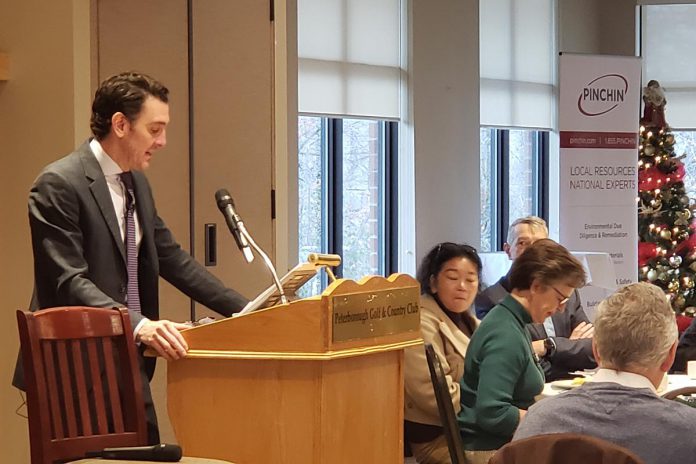
Before revealing what he could about the planned high frequency rail corridor, Imbleau paid homage to the late Tony Smith, who served as chair of the chamber’s board of directors and, as such, was a passionate advocate for passenger service linking Peterborough with points east and west.
“Tony said a train service, like the one we’re suggesting, will be a game changer for the (Peterborough) community,” said Imbleau. “An entrepreneur and an innovator, Tony rallied troops to support our train project because he knew that this vision was about more than a train. It was an infrastructure (project) that would not only carry people but would also bring opportunities … significant opportunities. He knew very well that this train would not only enhance transportation but that it would also carry dreams of a better tomorrow for Peterborough.”
After summarizing the benefits the high frequency rail corridor will have for communities along its 1,000-kilometre-plus passenger rail-dedicated track, such as heightened job activity during the construction process, reduced commuter times, a reduced carbon footprint, and new residential development, Imbleau outlined next steps.
“By next fall, the (federal) government will select a winning team,” Imbleau said. “From then on, our team will work with the private partner that was selected to scope the project in a progressive design deal approach. This type of public-private partnership allows us to work through the complexity of this important project together, enabling us to better assess the scope, the cost, and the calendar. It will take some time, for sure, but we will do it the right way.”
As for his motivation for taking on “the new adventure” of leading VIA HFR, Imbleau said he didn’t leave his prior position “to work on an abstract concept.”
“When I close my eyes and I see myself in 2040 and 2050, I just can’t imagine seeing millions more cars on congested costly highways. We need to act now for the future generations. We need to develop a transportation service that Canadians will pick over driving that is the smarter, more eco-friendly choice.”
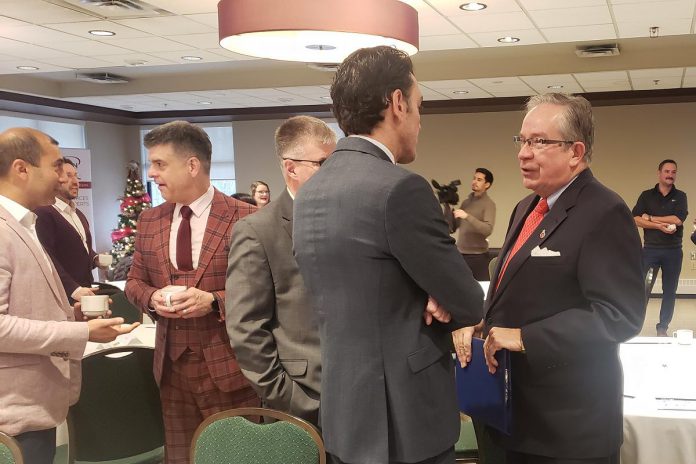
With the assurance that a project that has seen so many starts and stops is moving forward with renewed vigour ringing in their ears, the breakfast audience was then treated to a state-of-the-union-like address from Peterborough Mayor Jeff Leal.
In his comments, the former Peterborough MPP and provincial cabinet minister touched on the progress realized since he was elected mayor in October 2023, citing in particular the adoption of Peterborough’s inaugural strategic plan, the appointment of new CAO Jasbir Raina, the initial steps toward Service Peterborough “one-stop shopping” for residents and businesses interacting with municipal government, the introduction of curbside organic waste collection, and the establishment of the modular bridge housing community for 50 people experiencing homelessness.
“These units will help some of the most vulnerable people in our community,” said Mayor Leal. “I’ve often said, and I’ll repeat it here, people experiencing homelessness is the toughest policy issue that I’ve ever faced in my time in public life. There’s no playbook to follow.”
While much has been accomplished, said Mayor Leal, there remain major challenges on the horizon — challenges, he says, that must be met and overcome.
“Peterborough has an acute shortage of housing,” acknowledged Mayor Leal, noting the city’s vacancy rate of 1.1 per cent makes it the fourth tightest housing market in Canada while average rent is the 10th most expensive in the country.
“The lack of housing is one of the things I hear most about from residents and businesses,” said Mayor Leal. “The province has given us a target of 4,700 (new) housing units by 2031. I’ve committed to that target, but the city is only one part of the solution.”
“Our municipal services corporation is exploring opportunities to develop around 700 units over the next 10 years. But for the most part, the city’s role is the granting of approvals, not to build buildings themselves. We need a cooperative, collaborative, and constructive relationship with the private sector.”
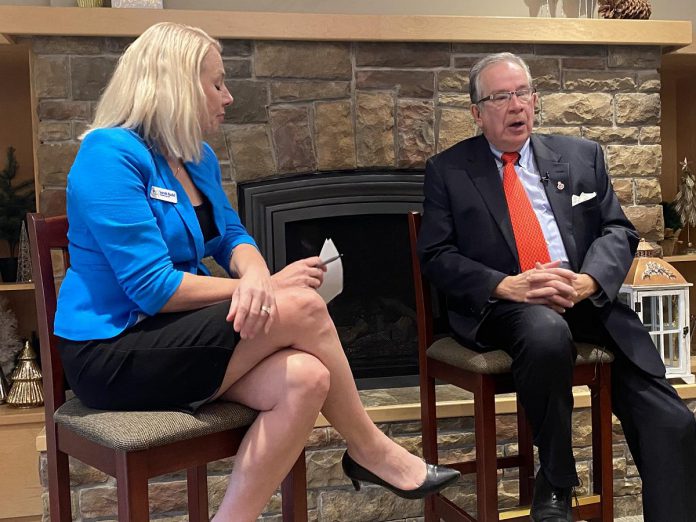
Noting that Peterborough’s tax base is comprised of 80 per cent residential and 20 per cent commercial/industrial, Mayor Leal said that “isn’t a healthy ratio.”
“We need to grow our employment land tax base to create new opportunities for residents and to ensure the financial health of our community,” he said. “We need to maintain infrastructure and services as we grow.”
“I’m eager to engage our neighbours who want to work together to create productive win-win mutually beneficial solutions. I know we’ve not been able to come together as a region over the past couple of decades for the benefit of our residents and communities. There’s a long history of disappointments on all sides. I want to move forward and I want to move forward together.”
To that end, Mayor Leal pledged that if a neighbouring township has a proposal for the city to extend services to their land in exchange for a share of tax revenue, “I’ll be happy any day to discuss that.”
Mayor Leal clarified that the city’s official plan has been amended in the past to allow for cross-border servicing, adding “We can and will amend the city’s official plan on a case-by-case basis for economic growth for all.”
Finally, speaking to the draft 2024 city budget and its proposed property tax increase of close to 10 per cent, Mayor Leal said he intends “to reduce that number” but warns “Whatever number we end up with will be a shock to residents.”
“We need to take action now. This is a course correction budget to avoid a series of double-digit increases down the road. We can’t keep kicking the can down the road. There are no more dents that can be kicked in. The tab is due. This budget will deliver results.”
“I hear from people all the time about what it’s like to drive down George and Water streets. These roads are an embarrassment to me and they should be an embarrassment to you. The budget will redevelop those roads in 2024.”
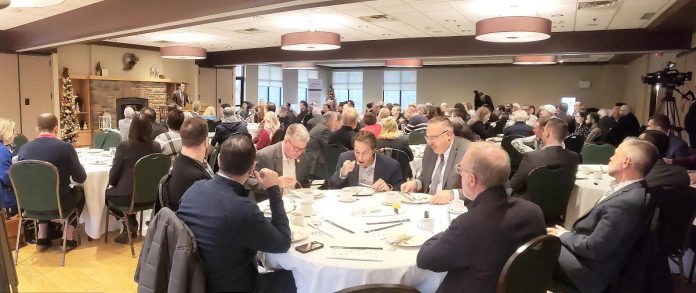
For her part, County Warden Clark was particularly interested in Mayor Leal’s comments concerning the cross-border servicing of city-neighbouring land.
“Christmas is getting close, so I’ll equate it to the turkey — we’ve got the carcass on the table but we’ve got to put some meat on the bones,” said Warden Clark.
“The city is looking for employment lands. How can we work together? He has said annexation is off the table. The municipalities that border the city were very glad to hear that. How we can make this work with a different model rather than annexation is a good start.”



